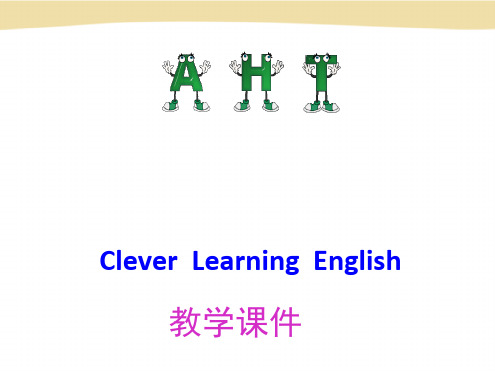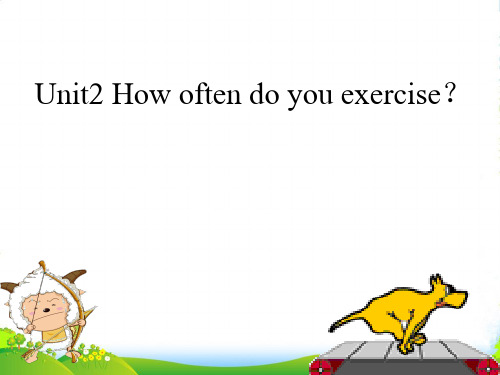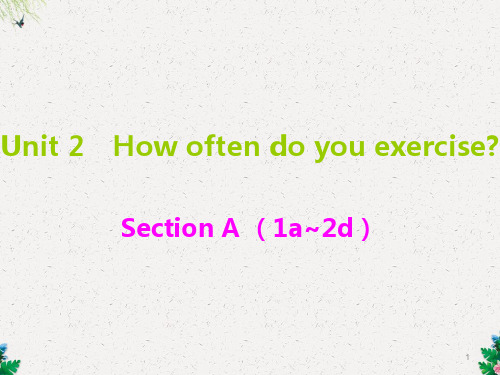人教版八年级上 课件 Unit 2第1课时New words and phrases
人教版八年级英语上册 Unit2 课件

Unit 7 Will people have robtos?教材解读本单元主要内容是通过引导学生展望未来,引出will 一般将来时的运用:随着各项活动的展开,使得学生形成更加科学合理的价值观,教材紧紧围绕展望未来这一主题展开了各项活动,旨在培养学生的听说读写技能。
单元目标一、知识与技能1. 能掌握本单元重点词汇:paper, pollution, prediction, future, pollute, environment, planet, earth, plant, part, play a part.2. 进一步学习运用所学的知识来陈述自己对将来的看法;学会谈论自己对将来的预言。
3. 掌握情态动词will来表达一般将来时态这一语法知识,4. 提高听力、阅读、写作能力。
二、过程与方法Explanation, discussion, listening, pair work.三、情感、态度与价值观通过引导学生展望未来,及对未来生活的设计,来达到前景教育的目的,同时也通过对前景的设想,让学生在潜移默化中反省自己的现状,培养更加优秀的生活习惯和学习习惯,并形成更科学的价值观。
在学习过程中培养小组合作精神,锻炼他们的胆量,激发学习兴趣。
教法导航以学生为中心,以活动为驱动点,以任务为目标的教学方式,充分利用多媒体,让学生在活动中感知、领悟、体验和实践语言知识要点。
学法导航在实践与合作中提高语言的综合使用能力,加深对基础知识的掌握和记忆。
课时支配第1课时:Section A1a-2c第2课时:Section A 2d-3b第3课时:Section B 1a-2e第4课时:Section B 3a-Self Check第1课时Section A 1a-2c教学目标一、知识与技能1. 能掌握以下单词:paper, pollution, prediction, future, pollute, environment, planet, earth, plant, part, play a part.2. 能掌握以下句型:What will the future be like?Cities will be more polluted. And there will be fewer trees.Will people use money in 100 years?Will there be world peace?Kids will study at home on computers.They won’t go to school.二、过程与方法采用目标和直观教学法,调动学生的积极性,引导他们积极参与课堂。
人教版初中英语八年级上册Unit-2Section-B-1a-1e-教学课件

abc
d
ef
be good for our health be bad for our health
1b PAIRWORK
Ask and answer questions. Use the words from 1a.
A: How often do you drink milk, Liu Fang? B: I drink milk every day. A: Do you like it? B: No. But my mother wants me to drink it.
八年级(上)
八年级英语上(RJ) 教学课件
Unit 2
How often do you exercise?
Section B (1a-1e)
学习目标
➢ Key words & phrases:
junk,coffee,health,junk food,be good for
➢ Key sentences:
two_o_r_t_h_re_e_t_im__e_s _a_week three_o_r__fo_u_r_t_im__es__a_week
____n_e_v_e_r_____
_fo_u_r_t_im__e_s _a_d_a_y_
Practice
1e
PAIRWORK
Student A is the reporter. Student B is Tina or Bill. Ask and answer questions. Then change roles.
She says it’s good for my health.
junk food once a month
人教版新目标八年级英语上册Unit2SectionB1a 1e教学课件共33张

展:
Listen for the specific ideas of 1c 听取细节
Listen to an interview about two 1c people's daily habits. Circle your
answer to each question.
Does Tina have good habits?
★ health(名)/healthy(形) 健康/健康的
Health is better than wealth.
(健康胜于财富).
So we should keep healthy .
所以我们要保持健康。
导:
Is it healthy or unhealthy?
healthy: milk, vegetables, fruit, junk food unhealthy: coffee, Hamburger, chips
Questions
Tina
Bill
1.How often do you exercise? Every day Hardly ever
2.How often do you eat fruit? Every day Never
3.How many hours do you sleep every night?
junk food once a month
A: How often do you eat junk food?
B: Once a month. A: Do you like it? B: Yes. But my mom says it's not good
for my health.
展:
vegetables
人教版八年级上册英语Unit2_SectionB(1a1e) 优质课课件 (共24张PPT)

3.To have a healthy eating habits
Warming up
Are you healthy?
Notes
1. Mom wants me to drink it. want to do sth. 想要做某事 want sb. to do sth. 想要某人做某事 Do you want to go to the movies with me? 你想和我一起去看电影吗? The teacher doesn’t want us to eat hamburgers. 老师不想让我们吃汉堡包。
food?
times a week times a week
6.How often do you drink coffee?
never
four times a day
Tapescript
Reporter:Hi, Tina and Bill. Let’s start with the
first question. How often do you exercise? Tina: Every day. Bill: Hardly ever. Reporter:How often do you eat vegetables and fruit? Tina: I eat vegetables and fruit every day. Bill: I sometimes eat vegetables. But I never
Because …is/are good for our health.
Unit 2 第1课时 Section A(1a-2d)(课件)八年级英语上册(人教版)

学习能力:学会观察主题图,从图中发现细节信息;学会在听力练习中捕捉并 记录关键词。学会借助图片、场景、人物等信息进行预测,注意捕捉关键
信息;注意使用频率副词描述活动。
Weekend activities
What do you usually do?
I usually ……
go shopping
help with housework
What do you usually do?
I usually ……
do homework
watch TV
What do you usually do?
I usually ……
go to the movies
play soccer
What do you usually do?
I usually ……
play football
play basketball
What do you usually do?
I usually ……
do one’s homework
exercise
go to the movies
What do you usually do?
I usually ……
语言能力: 1. 能掌握本课时出现的新词汇,通过听力了解程涛课余活动和阅读对话了 解Claire的课余活动安排Claire的课余活动。 2. 能通过主题图呈现单元的语境、话题及话题下的基本词汇和目标句型, 准确的表达出活动名称,频率副词。
3. 能用频度副词及一般现在时简单谈论周末活动情况;能结合实际情况进 行对话练习,对同伴和自己的课余活动及其频率进行询问和作答。 文化意识:体会中西方学生丰富多彩的课余活动,了解swing dance。 思维品质:关注自己和他人的日常行为,树立健康的周末活动意识。养成健 康的饮食习惯,保证充足的睡眠时间,进行合理的 运动锻炼,以保持健
人教版八年级英语上册课件:Unit 2(共29张PPT)

要点梳理
【应用】
( B )They found the old man without any difficulty, for he has _____ changed over the
years.
A. clearly
B. hardly
C. greatly
D. nearly
13
要点梳理 3 once的用法 【教材例句】I have class once a week, every Monday. 我每周一上一次课。(教材第10页) 【要点思维导图】
Unit 2 How often do you exercise?
Section A (1a~2d)
1
课前导学
核心单词 1. _h_o_u_s_e_w__o_r_k__ n. 家务劳动;家务事 2. __h_a_rd_l_y____ adv. 几乎不; 几乎没有 3. ___o_n_c_e____ adv. 一次;曾经 4. ____tw__ic_e____ adv. 两次;两倍 5. ___In_t_e_rn__e_t _ n. (国际)互联网;因特网 6. __p_r_o_g_r_a_m__ n. 节目 7. _____f_u_ll____ adj. 忙的;满的;充满的
5
课前导学 单元语法
频率副词的使用以及what与how often 句型的提 问、回答;一般现在时态的用法 语言目标
学会如何结合频度副词谈论事情发生的频率
6
要点梳理 重点词汇精析
1 exercise的用法 【教材例句】How often do you exercise? 你多久做 一次运动?(教材第9页) 【要点思维导图】
率。如:
twice a week 一周两次
人教版八年级上册Unit2英语说课ppt教学文稿[文字可编辑]
![人教版八年级上册Unit2英语说课ppt教学文稿[文字可编辑]](https://img.taocdn.com/s3/m/379b3e3afab069dc512201b0.png)
Moral objectives
Students should be able to
?Communicate with each other fluently.
?Pay more attention to daily life.
1:Teaching Material
1
Status & Function
6
Blackboard Design
Teaching Procedure
1
Greeting
2
Leading-in
3 Presentation and Practice
4
Do a survey
5
Homework
fly kites
eat junk food
go swimming
listen to music
Contents
1
Teaching Material
2
Students' Analysis
3
Teaching Methods and Learning
Strategies
4
Teaching Aids
5
Teaching Procedure
6
Blackboard Design
Blackboard Design
...
Do a survey
Activities How often
Take a shower Wash your hair Exercise Clean your room
Homework
1.Do exercises on pages 1-2 of the workbook to practice the language presented in this unit. 2.Optional activity: write a passage of family members' lifestyles in English about 30-40 words.
人教版 八上 Unit2 SectionA 1a-2b 课件(共20张PPT)

• 提升题 • I. 完成句子。 • 1. 周末你通常做些什么?
• What _d__o_ you usually __d_o_ on weekends? • 2. --- 你多久看一次电视? • H__o_w__ o_f_t_e_n_ do you watch TV? • ---- 每天都看。 _E__v_er_y_ __d_a_y__ . • II.连词成句
three times a week
once a month twice a month
• --What do you do on weekends? • --I go shopping. • --How often do you go shopping? • --Once a month.
达标检测
100%
≥ 80%
≥ 60%
always 一直,总是 usually通常 often 经常
≥ 20%
< 5%
0%
sometimes 有时 hardly ever几乎不 never从不
补充:seldom ['seldəm] 很少
Listen and write the activities
1b next to the correct frequency
• 1. often do exercise how you • _H_o_w__o_f_t_e_n_d_o__y_o_u__e_x_e_rc_i_s_e_?
• 2. hardly I watch ever TV • __I_h_a_r_d_ly__e_v_e_r_w__a_tc_h__T_V___.
hard既可作形容词“困难的”“硬的”,也用副词,意 为“努力地、刻苦地”,“猛烈地,大地” 。 e.g. He studies hard before exams.
- 1、下载文档前请自行甄别文档内容的完整性,平台不提供额外的编辑、内容补充、找答案等附加服务。
- 2、"仅部分预览"的文档,不可在线预览部分如存在完整性等问题,可反馈申请退款(可完整预览的文档不适用该条件!)。
- 3、如文档侵犯您的权益,请联系客服反馈,我们会尽快为您处理(人工客服工作时间:9:00-18:30)。
television program (电视,节目)
What television program do you like ?
coffee(咖啡) I don’t like drinking coffee.
junk food (垃圾食品)
We shouldn't eat too much junk food
Remember the words by their similar forms.
and pronunciation
1. _[_i_]_ sing wing king swing 2. [_a_i_]_ kind mind rice twice 3._[_∧__]_ but must such result 4._[_e_]__ never ever Internet less 5._[_∧__]_ one won once none
percent, television, mind, body, writer, dentist, online, such, hardly, ever, once, twice, maybe, least, together, however, almost, less, although, than, through 2. 能争取学会使用下列常用短语和句子(Useful expressions) hardly ever, swing dance, at least, junk food, such as, more than, less than 3.能就经常进行的活动这一话题进行问答交流,正确表达自己 的情感。 4. Understand, translate and retell a passage made up of the above Curriculum words and phrases according to a mind map (理解、翻译并复述用本单元单词短语编写的故事。)
dentist (牙科医生)
I want to be a dentist .
always
usually often
metimes
hardly ever
never
100%(percent) 80%
总是
通常
60% 经常
40% 有时
20% 很少,几乎 不
0 从不
1.Always means one hundred percent . 2.She eats fruits once(一次) a month .she hardly ever eats fruit. 3.My father exercises twice(两次) a week .He sometimes exercises once a week .
Remember the words by conversion(换),complex words(合成词)and derivative(派生词).
1.转换:Would you mind exercising with me? Exercise is healthy for the mind and the body.
The students exercise every day at school .
housework (家务)
The children help her mother with housework .
Internet (互联网)
Most young people like using Internet.
Learn the phase by matching itself with its meaning.
1. hardly ever 2. at least 3. swing dance 4. junk food 5. more than 6. less than
a.摇摆舞 b.少于 c.几乎从不 d.垃圾食品 e.至少,不少于 f.多于
2.合成:housework家务劳动 house(房子)+ work(工作) online 在线的,联网的 on(在…上的)+line(线) however 然而,不过 how(怎样)+ever(以前曾经)
Get some individual students to read the words and ask other students to correct the pronunciation.
learn the words by looking at the pictures.
exercise (锻炼)
Unit 2
How often do you exercise?
Teaching and Learning Goals:
一、语言知识和语言功能: 1.能争取学会使用下列词汇造句子(Curriculum words) housework, Internet, program, swing, coffee, health,result,
Teaching and Learning Goals:
二、学习策略 1.通过观察比较发现规律,掌握新单词
的发音和拼写 2. 学会在语境中记忆单词 三、情感目标: 1.了解中西方中学生常进行的活动。 2.了解一些健康小常识。
Try to read the words.
Students try to read the words using the phonetics by themselves and underline the words they can’t read.
Ask students to read the word together and then read aloud freely.
Read after the tape and pay attention to the pronunciation .
Students read the words with their partners in groups and talk about the difficult words.
